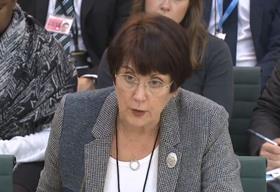But her final report, published today, does not recommend a ban

The author of the government-commissioned review of fire safety in buildings has said she would support the government if it chose to ban the use of combustible cladding on high rises, despite not recommending it in her report.
Speaking at the publication of her report – which ignored calls to make detailed recommendations to clarify building regulations guidance – Dame Judith Hackitt said: “I’m clear that under the system I’m proposing buildings will only be clad with materials that are safe and non-combustible. The new system will stop it from happening.”
Hackitt said that rather than making specific recommendations about individual changes to guidance such as banning certain materials, her priority had been to devise a whole regulatory system that delivered safe buildings. However, in response to questions she said she would support the government if it decided to ban the use of combustible materials in response to her report.
“If people feel I haven’t gone far enough, for example, and want further clarity on specific materials then I’d be fine with that…If the secretary of state decides to ban [combustible cladding] I would be supportive.”
Tottenham MP David Lammy, who knew victims of the fire at Grenfell Tower, has already branded the report a “betrayal and a whitewash” for not taking direct action on combustible cladding.
Defending her approach, Hackitt said: “If people think that simply banning cladding will solve this they’re mistaken. It’s a broken system. The next problem might not be cladding. I’m trying to fix the system.”
Hackitt also made clear she envisaged a less prescriptive system of building regulation guidance in future, with government setting the outcomes and the industry left to devise the specific guidance as to how to meet those outcomes. She said this system would work through the creation of a unified regulatory body, called the JCA, made up of Local Authority Building Control, Fire and Rescue Authorities and the Health and Safety Executive to oversee and approve plans at key points, coupled with far greater sanctions – including imprisonment – where regulations have been broken.
“It’s about those who create risk being held accountable for managing it. There have been far too many opportunities for those who seek to take short cuts who have been reasonably confident they will get away with it. It’s fundamentally about taking responsibility.
She added: “There is too much prescription in what we have today. No longer should the building industry look to other bodies to tell them what is and isn’t acceptable. It’s time for the industry sector to live up to its responsibility.”
New communities secretary James Brokenshire is expected to make a statement in the House of Commons at 12.30 today on the findings of the report, outlining the government’s response.




























No comments yet